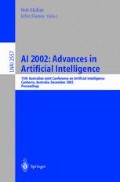Abstract
Coordination is an important issue in multi-agent systems when agents want to maximize their revenue. Often coordination is achieved through communication, however communication has its price. We are interested in finding an approach where the communication between the agents is kept low, and a global optimal behavior can still be found.
In this paper we report on an efficient approach that allows independent reinforcement learning agents to reach a Pareto optimal Nash equilibrium with limited communication. The communication happens at regular time steps and is basicallya signal for the agents to start an exploration phase. During each exploration phase, some agents exclude their current best action so as to give the team the opportunityto look for a possiblyb etter Nash equilibrium. This technique of reducing the action space byexclusions was onlyrecen tlyin troduced for finding periodical policies in games of conflicting interests. Here, we explore this technique in repeated common interest games with deterministic or stochastic outcomes.
Access this chapter
Tax calculation will be finalised at checkout
Purchases are for personal use only
Preview
Unable to display preview. Download preview PDF.
References
Claus C., Boutilier C.: The dynamics of reinforcement learning in cooperative multi-agent systems. Proceedings of the fifteenth National Conference on Artificial Intelligence,(1998) p 746–752.
Hu J., Wellman M. P.: Multi Agent Reinforcement Learning. Journal of Machine Learning Research 1 (2002) p 1–32.
Jafari, C., Greenwald, A., Gondek, D. and Ercal, G.: On no-regret learning, fictitious play, and nash equilibrium. Proceedings of the Eighteenth International Conference on Machine Learning, (2001) p 223–226.
Lauer, M., Riedmiller, M.: An algorithm for distributed reinforcement learning in cooperative multi-agent systems. Proceedings of the seventeenth International Conference on Machine Learning (2000)
Litmann M.L.: Markov games as a framework for multi-agent reinforcement learning. Proceedings of the Eleventh International Conference on Machine Learning, (1994) p 157–163.
Narendra K., Thathachar M.,: Learning Automata: An Introduction. Prentice-Hall (1989).
Nowé, A., Parent, J., Verbeeck, K.: Social agents playing a periodical poliy. Proceedings of the 12th European Conference on Machine Learning, (2001) p 382–393)
Nowé, A., Verbeeck, K.: Distributed Reinforcement learning, Loadbased Routing a case study. Proceedings of the Neural, Symbolic and Reinforcement Methods for sequence Learning Workshop at ijcai99.
Osborne J.O., Rubinstein A.: A course in game theory. Cambridge, MA: MIT Press (1994).
Sutton, R.S., Barto, A.G.: Reinforcement Learning: An introduction. Cambridge, MA: MIT Press (1998).
Samuelson, L.: Evolutionarygames and equilibrium selection. Cambridge, MA: MIT Press (1997).
Verbeeck, K., Nowé, A., Parent, J.: Homo egualis reinforcement learning agents for load balancing. Proceedings of the first NASA Workshop on Radical Agent Concepts. (2002)
Author information
Authors and Affiliations
Editor information
Editors and Affiliations
Rights and permissions
Copyright information
© 2002 Springer-Verlag Berlin Heidelberg
About this paper
Cite this paper
Verbeeck, K., Nowé, A., Lenaerts, T., Parent, J. (2002). Learning to Reach the Pareto Optimal Nash Equilibrium as a Team. In: McKay, B., Slaney, J. (eds) AI 2002: Advances in Artificial Intelligence. AI 2002. Lecture Notes in Computer Science(), vol 2557. Springer, Berlin, Heidelberg. https://doi.org/10.1007/3-540-36187-1_36
Download citation
DOI: https://doi.org/10.1007/3-540-36187-1_36
Published:
Publisher Name: Springer, Berlin, Heidelberg
Print ISBN: 978-3-540-00197-3
Online ISBN: 978-3-540-36187-9
eBook Packages: Springer Book Archive

